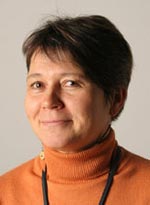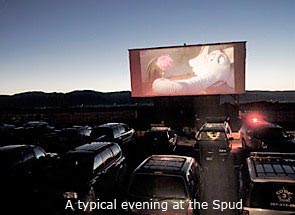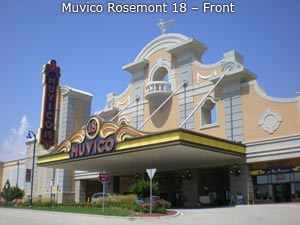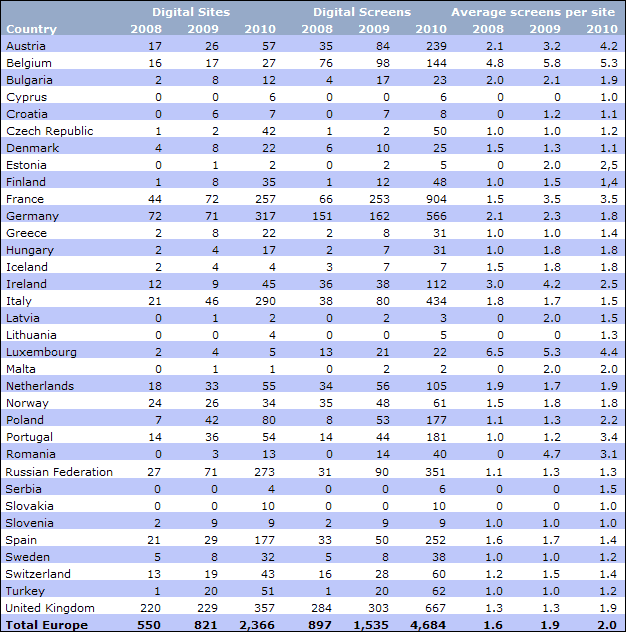
Reg. Trib. Milano n. 418 del 02.07.2007
Direttore responsabile: Elisabetta Brunella
![]()
![]()
International Edition No. 64 - year 5 - 1 September 2010

***
Dear readers,
 to
the appointment in Venice we shall be bringing “DiGiTalk”,
our most recent tool for information on the digital transition, which,
according to the MEDIA Salles tradition, is based on sharing the experiences
of those who have invested resources and competences in the new technology,
and on the publication of statistics that are as up-to-date and reliable
as possibile. Facts and figures available to those who wish to understand
which path the future of the cinema and the cinemas is taking. You are
also invited to take note of the dates for the next “DiGiTraining
Plus”, the unique training initiative which, since 2003, has been
guiding Europe’s professional players through the challenges and
opportunities offered by digital technology to the cinema industry. From
29 June to 3 July 2011, for the seventh time MEDIA Salles will be bringing
together those who have already experienced the change and those who wish
to meet the new scenario with the necessary awareness and knowledge.
to
the appointment in Venice we shall be bringing “DiGiTalk”,
our most recent tool for information on the digital transition, which,
according to the MEDIA Salles tradition, is based on sharing the experiences
of those who have invested resources and competences in the new technology,
and on the publication of statistics that are as up-to-date and reliable
as possibile. Facts and figures available to those who wish to understand
which path the future of the cinema and the cinemas is taking. You are
also invited to take note of the dates for the next “DiGiTraining
Plus”, the unique training initiative which, since 2003, has been
guiding Europe’s professional players through the challenges and
opportunities offered by digital technology to the cinema industry. From
29 June to 3 July 2011, for the seventh time MEDIA Salles will be bringing
together those who have already experienced the change and those who wish
to meet the new scenario with the necessary awareness and knowledge.
Elisabetta Brunella
Secretary General
(Per
leggere il testo in italiano cliccare qui)
| “MEDIA
SALLES AT THE 67th INTERNATIONAL VENICE FILM FESTIVAL”
During the 67th Venice Film Festival, Elisabetta Brunella, MEDIA Salles Secretary General, will present the 2011 edition of the course “DigiTraining Plus: European Cinemas Experiencing New Technologies” on 4 September at the initiative “ART CINEMA – ACTION + MANAGEMENT” organized by the CICAE. MEDIA Salles will made available its most recent publication on digital cinema: DiGiTalk a streamlined volume that sums up the main content of the course “DigiTraining Plus: European Cinemas Experiencing New Technologies”, held last February, together with a series of statistics and graphs on digital projection in Europe and throughout the world.
|
![]()
SAVE THE DATE
The eighth edition of the
“DigiTraining Plus:
European Cinemas
Experiencing
New Technologies”
course will take place
from 29 June to 3 July 2011
Further information will be published
on our website, at the page dedicated
to the course:
http://www.mediasalles.it/training/training.htm
WOMEN IN DIGITAL CINEMA
Pilvi Burman
FS Film Oy
 DCP,
KDM, NGB, OMG: how am I ever going to learn all this?
DCP,
KDM, NGB, OMG: how am I ever going to learn all this?
Those were my thoughts two years ago when I started working as Production
Manager at FS Film Oy and found myself sending out ‘DC Readiness
Forms’ to theaters that had started to digitize at an increasing
pace. I had been taking care of 35mm print production and coordination
for most of my working career with different distributors in Finland,
but this was an unknown playground. Most of the terms on the readiness
forms were beyond my understanding and I was on thin ice.
However, I was lucky, having been in the business for quite a while and
having always had good contacts with the technicians dealing with the
new digital equipment in theaters. At the beginning I could always call
up one of them and they never seemed to get tired of even the most stupid
questions. It was also comforting to know that my colleagues at other
distributors were in the same situation as me. Sharing information has
always been one of the greatest things we cherish in the Finnish film
distributors’ small community.
The terms DCP and KDM were totally abstract until I made an excursion
to a projection booth to see what happens to the hard drive once it arrives
at the theater and how a DCP and a KDM meet. It helps to understand things
when you see them with your own eyes – even if it is something you
don’t need to learn how to use in practice.
Having learned from my own experience that the new terminology in a foreign
language may seem frightening at the beginning, I have tried to be of
help to theater owners in Finland who are trying to make their way through
the jungle of readiness forms from different studios. I have also tried
to be available for them if they have problems with receiving DCPs and
KDMs. I have found it very important to have someone to turn to when you
have a question and I must say that the people behind the impersonal title
‘keymanager’ have been very friendly and helpful.
Dealing with digital film distribution has not made me an IT-expert even
though I have learned a lot. Little by little the ordering and production
process of digital prints and trailers and KDMs along with the traditional
35mm material production have become routine procedures. This far I have
ordered digital material from one major studio and one smaller studio.
Within a year or so there will be more studios I’ll be ordering
digital prints from.
The people at the studios may also be dealing with a digital release for
the first time in their lives, so it is good to remember that this is
a learning process for everybody involved.
As soon as we think we know what we are doing, there will be a whole new
ballgame waiting for us. Time will tell whether it is called SmartJog
or something else.
(Per leggere il testo in italiano
cliccare qui)
The American digital summer INAUGURATION IN THE UNITED STATES OF THE FIRST DIGITAL DRIVE-IN
|
||||||||||||||||||||
| THE CANADIAN EMPIRE THEATRES TO INSTALL 300 BARCO PROJECTORS  Last
June Empire Theatres Limited, the second largest exhibition company
in Canada, with headquarters in Nova Scotia, signed an agreement with
Barco for the digitization of over 300 screens. Installation will
begin in the autumn and continue in 2011. Last
June Empire Theatres Limited, the second largest exhibition company
in Canada, with headquarters in Nova Scotia, signed an agreement with
Barco for the digitization of over 300 screens. Installation will
begin in the autumn and continue in 2011.Empire Theatres, which has been in operation for over 30 years, possesses 50 cinemas for a total of 380 screens: of these 50 had already been fitted with Barco projectors and equipped for 3D. For the new order Empire Theatres has selected several models from Barco’s Series II: the DP2K-15Cs, the DP2K-20Cs as well as the DP2K-32B which can be upgraded to 4K, combined with a Doremi server. Commenting on the choice, Valerie Ryan, Vice President for Empire Theatres’ development and real estate, stated: “Barco's wide range allows us to put the right projector on the right screen. This means cost savings for the digital transition in our chain of cinemas.” (Per leggere il testo in italiano cliccare qui) |
||||||||||||||||||||
| NEW EPIC THEATRES MULTIPLEX ENTIRELY DIGITAL Located in DeLand, Florida, Epic Theatres is
an exhibition company which, although far from reaching the huge
numbers of the leading U.S. chains, is experiencing a phase of considerable
development. |
||||||||||||||||||||
| All different, all digital by Elisabetta Brunella This column hosts portraits of cinemas in Europe and the rest of the world which are quite different from one another but have in common the fact that they have all adopted digital projection.
Muvico Rosemont 18
|
||||||||||||||||||||
| News on
the development of digitalisation in Europe THE VENICE FESTIVAL REWARDS 3D Created last year in order to
acknowledge the film that has made the most creative use of stereoscopic
3D, the Persol 3D award returns to the 2010 edition of the Venice
Film Festival. Awarded to The Hole, by Joe Dante, in 2009, this
is the first international award of its kind and confirms Venice’s
faith in the effectiveness of this means of expression. |
||||||||||||||||||||
2010 will be remembered as the
first live 3D World Cup in history. In Europe, Open Sky, an Italian
company specialized in the distribution of digital content via satellite,
broadcast 25 games for a total of 75 hours live in 3D. |
||||||||||||||||||||
| CINEPLEX SIGNS VPF AGREEMENT WITH XDC Cineplex has signed
an agreement with XDC regarding the digitization of 451 screens,
using the VPF formula. The German company, which will be using Film
Ton Technik for the installation, also intends equipping itself
for 3D projection and the offer of live entertainment events. |
||||||||||||||||||||
| THE GERMAN KINOPOLIS TO BE ENTIRELY DIGITAL IN 2011 Last
month, Kinopolis, the fifth largest exhibition chain in Germany,
announced that by 2011 all 123 of its screens would be digital. |
||||||||||||||||||||
| GERMANY – THE MINISTER’S PROPOSALS FOR DIGITIZING CINEMAS The German Minister of Culture and the Media (BKM), Bernd Neumann, has presented a proposal for encouraging the digitization of cinemas in Germany and in particular to ensure that the transition to the new technology will not exclude any of the existing theatres. Following this plan the less
profitable cinemas, such as art house venues or those operating
in small places, will nonetheless be able to convert to digital. |
||||||||||||||||||||
| OVER 500 DIGITAL SCREENS IN ITALY While MEDIA Salles elaborates the situation at 30 June 2010, confirmation comes from Italian exhibitors that the numbers of digital screens have continued to increase: at the end of April they were beyond the 500 mark. After a late start compared to other markets, in Italy the digital transition experienced an authentic boom in 2009. It is sufficient to recall that 80 digital projectors had been counted by MEDIA Salles in Italy at 1st January 2009 , whilst at 30 June the same year the number had risen to 183, then leaping to 428 at 1st January 2010. When communicating the figures at the end of April 2010, Paolo Protti, President of Anec – the national association of cinema exhibitors – stated that overstepping the 500-screen threshold is confirmation that cinema exhibition is the key element in the Italian audiovisual industry. Carlo Bernaschi, President of Anem – the national association of multiplex exhibitors - is of the same opinion: “Thanks to digital even city theatres will be able to locate new directions and strategies, from the possibility of offering quality programming to the offer of alternative content.” Looking to the future, Richard Borg, CEO of Universal in Italy, thinks it possible that in the wake of this recent development, complete digitalization of the Italian theatres will be completed by 2012. Lombardy and Lazio are the most digitalized regions in Italy, respectively with 70 and 64 screens. Rome confirms its position as capital with 31 screens, followed by Milan with 18. (Per leggere il testo in italiano cliccare qui) |
||||||||||||||||||||
| CINEMADIGITAAL.NL LAUNCHED, TO SPEED UP THE DIGITAL TRANSITION IN HOLLAND The announcement came last July of the creation of CinemaDigitaal.nl, a body that will be devoted to simplifying and speeding up the digital transition of distributors and cinemas operating in Holland. CinemaDigitaal.nl arises out of the joint forces of various organizations in the Dutch cinema industry: NVB, the exhibitors’ association, NVF, which brings together the distributors, and EYE, the national Film Institute. It is estimated that the conversion to digital will cost 39 million Euros, of which 6 million are allocated by the State, whilst the remainder will be the responsibility of the members of the associations constituting CinemaDigitaal.nl. The importance of the project emerges clearly in the EYE Film Institute’s press release: “Smaller theatres, art house and independent cinemas as well as small distributors of European art house movies have risked being excluded from digital technologies, whilst on the other hand this innovation is exactly what brings great opportunities for growth and variety of distribution and exhibition.” Thanks to the new project Dutch
cinemas should also witness simpler and more rapid access to 3D
programming and classics, as well as alternative content such as
opera, concerts and theatre. |
||||||||||||||||||||
WORKSHOP ON DIGITAL CINEMA AT THE LOCARNO FILM FESTIVAL As a new addition to the 2010 edition, during its Industry Days the Locarno International Film Festival hosted a workshop on the distribution of digital, organized by Europa Distribution and CN Films. The workshop, which was part of the EDCL (European Digital Cinema Library) Project, promoted by the European Union’s MEDIA Programme, was held on 7 August and attended by around 30 European distributors. It concentrated on an analysis of the technical aspects of digitization through the study of various case histories. (Per leggere il testo in italiano cliccare qui) |
||||||||||||||||||||
| HOW MANY DIGITAL SCREENS IN EUROPE? MEDIA Salles is now preparing the
situation of digital screens and cinemas in Europe at 30 June 2010. Digital cinema sites and screens in Europe (as at 1st January)
|
MEDIA Salles’ contacts and address
MEDIA Salles
Piazza Luigi di Savoia, 24 – 20124 Milano - Italy
Tel.: +39.02.6739781 – Fax: +39.02.6690410
E-mail: infocinema@mediasalles.it
Sito web: www.mediasalles.it

 It
is called “Spud” and is located in Driggs, Idaho, at
the foot of the majestic Grand Teton Mountains, has been in operation
for 57 years and is faithful to a 1950s style whilst placing the
odds on avant-garde technology: on 9 July it became the first truly
digital drive-in.
It
is called “Spud” and is located in Driggs, Idaho, at
the foot of the majestic Grand Teton Mountains, has been in operation
for 57 years and is faithful to a 1950s style whilst placing the
odds on avant-garde technology: on 9 July it became the first truly
digital drive-in.  To
recreate the atmosphere of the ‘twenties “movie palaces”:
this is Muvico’s purpose in building the Rosemont complex
in Illinois, overlooking Chicago’s O’Hare airport. The
decorated façade, the marble and woodwork inside, the mediterranean
views “painted” on the side walls in the theatres are
intended to recall the luxury of the cinema’s golden age and
mark the difference to the contemporary taste of today’s multiplexes.
However, when it comes to technology, Muvico’s main aim is
to have the latest. Inaugurated in September 2007, this Megaplex,
seating almost 4000, is in fact the first that the Florida-based
company running a total of 154 screens in 9 different venues has
decided to equip entirely with Sony 4K projectors. “We have
been the forerunners,” says Ben Volpert, Senior Operations
Manager of the complex, “not only here in the United States
but in the whole world. Suffice it to say that it was to us Sony
delivered their number 7 projector, following the six installed
in Japan!” Obviously the offer of 3D is not lacking, on 4
screens fitted with RealD equipment including a choice of glasses:
one for adults and one for children. The 18 screens – offering
over 600 screenings per week – mainly serve customers consisting
of families and young people, only partly coming from Rosemont itself,
a town with around 5,000 inhabitants famous mostly for its hotels,
used by passengers at Chicago’s main airport. Spectators come
in from the suburbs of the Windy City using the subway – there
is a blue line stop only a short distance from the cinema –
or after a 10/20-miles drive.
To
recreate the atmosphere of the ‘twenties “movie palaces”:
this is Muvico’s purpose in building the Rosemont complex
in Illinois, overlooking Chicago’s O’Hare airport. The
decorated façade, the marble and woodwork inside, the mediterranean
views “painted” on the side walls in the theatres are
intended to recall the luxury of the cinema’s golden age and
mark the difference to the contemporary taste of today’s multiplexes.
However, when it comes to technology, Muvico’s main aim is
to have the latest. Inaugurated in September 2007, this Megaplex,
seating almost 4000, is in fact the first that the Florida-based
company running a total of 154 screens in 9 different venues has
decided to equip entirely with Sony 4K projectors. “We have
been the forerunners,” says Ben Volpert, Senior Operations
Manager of the complex, “not only here in the United States
but in the whole world. Suffice it to say that it was to us Sony
delivered their number 7 projector, following the six installed
in Japan!” Obviously the offer of 3D is not lacking, on 4
screens fitted with RealD equipment including a choice of glasses:
one for adults and one for children. The 18 screens – offering
over 600 screenings per week – mainly serve customers consisting
of families and young people, only partly coming from Rosemont itself,
a town with around 5,000 inhabitants famous mostly for its hotels,
used by passengers at Chicago’s main airport. Spectators come
in from the suburbs of the Windy City using the subway – there
is a blue line stop only a short distance from the cinema –
or after a 10/20-miles drive.  At
the Muvico they know they are going to find special comfort –
the seats are almost 4 inces wider than average – but what
attracts them most is the quality of projection. “We have
run surveys amongst our customers: a large number of them say that
the picture is far clearer in our cinema and the sound is better.
Maybe they can’t explain why but they certainly appreciate
the difference,” states Ben Volpert. This comes together with
an environment that is considered safe and reliable: parents arrange
for one of them to take a group of youngsters to the Muvico by car
and pick them up in a few hours’ time. In the meantime they
will have seen a film, enjoyed themselves in the digital games room
and eaten some popcorn or pizza. For those who are looking instead
for a higher quality gastronomic experience – not necessarily
linked to viewing a film – the Muvico offers the Bogart’s
bar and grill on the second floor. The greater prestige of this
area is marked by the change from carpeting to parquet, whilst on
the walls silent films run on digital screens. Here the restaurant,
seating 150, serves the “favorites” of U.S. cooking,
from Buffalo chicken wings to “penne pasta”. For those
over twenty-one the Muvico also offers a lounge bar with a wide
variety of cocktails and alcoholic drinks, including 27 different
types of beer, amongst which the Italian Nastro Azzurro. And if
all this were not sufficient to make the evening into a special
experience, spectators can opt for the “Premier Theatre”
version: leaving their car more or less at the threshold of the
cinema, a valet will deal with the parking and they will receive
free popcorn and be accompanied to the upper part of the theatre,
where they will view the film apart from the rest of the audience
from the comfort of soft “love seating” sofas. “The
average citizen is treated like royalty” was the promise of
the movie palaces in the good old days: for 20 dollars – instead
of ten – the “Muvico treatment” is still within
reach.
At
the Muvico they know they are going to find special comfort –
the seats are almost 4 inces wider than average – but what
attracts them most is the quality of projection. “We have
run surveys amongst our customers: a large number of them say that
the picture is far clearer in our cinema and the sound is better.
Maybe they can’t explain why but they certainly appreciate
the difference,” states Ben Volpert. This comes together with
an environment that is considered safe and reliable: parents arrange
for one of them to take a group of youngsters to the Muvico by car
and pick them up in a few hours’ time. In the meantime they
will have seen a film, enjoyed themselves in the digital games room
and eaten some popcorn or pizza. For those who are looking instead
for a higher quality gastronomic experience – not necessarily
linked to viewing a film – the Muvico offers the Bogart’s
bar and grill on the second floor. The greater prestige of this
area is marked by the change from carpeting to parquet, whilst on
the walls silent films run on digital screens. Here the restaurant,
seating 150, serves the “favorites” of U.S. cooking,
from Buffalo chicken wings to “penne pasta”. For those
over twenty-one the Muvico also offers a lounge bar with a wide
variety of cocktails and alcoholic drinks, including 27 different
types of beer, amongst which the Italian Nastro Azzurro. And if
all this were not sufficient to make the evening into a special
experience, spectators can opt for the “Premier Theatre”
version: leaving their car more or less at the threshold of the
cinema, a valet will deal with the parking and they will receive
free popcorn and be accompanied to the upper part of the theatre,
where they will view the film apart from the rest of the audience
from the comfort of soft “love seating” sofas. “The
average citizen is treated like royalty” was the promise of
the movie palaces in the good old days: for 20 dollars – instead
of ten – the “Muvico treatment” is still within
reach.